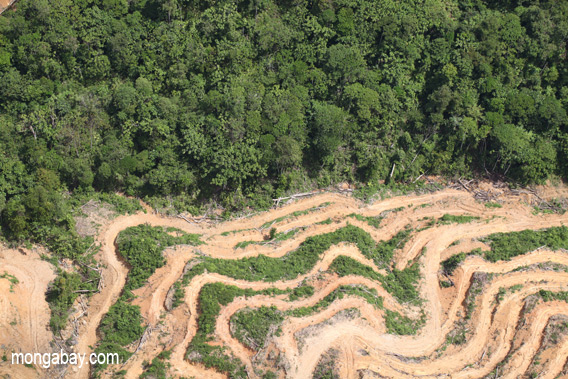
Indonesia burns 12.7 tons of illegal pangolin scales [Google Translate]
Indonesia’s Ministry of Forestry seized and burned 12.7 metric tons of pangolin Friday. Forestry Minister Zulkifli Hasan said the pangolin—called trenggiling locally— carcasses were seized in 2011-2012. The large keratin scales of pangolins are traded for cell phone covers as well as for use in traditional Chinese medicine. Officials from the National Police and the Attorney General’s Office also attended the burning. Authorities destroyed 12,677 kilograms of pangolin carcasses and 95.96 kilograms of dried scales.
Deforestation and climate change will negatively impact Borneo [Google Translate]
Ongoing deforestation and climate change is endangering Borneo, the world’s third largest island, according to a WWF report released Friday. The report, “Assessing the Impact of Climate Change in Borneo,” says climate change will worsen forest fires, and flooding on the island, potentially impacting human health, agriculture, and infrastructure.
SBY: many developed countries fail to reduce greenhouse gas emissions [Google Translate]
President Susilo Bambang Yudhoyono said many countries have failed to meet their Kyoto Protocol commitments to reduce greenhouse gas emissions.
Speaking in the campus of Indonesia’s Center for International Forestry Research (CIFOR), Yudhoyono said industrialized countries are not doing enough to support programs to reduce gas emissions in developing countries.
Controversial companies sponsor Indonesia’s pavillion at Rio +20 [Google Translate]
Indonesia’s pavilion at the Rio+20 Summit will be sponsored by mining giant Freeport and conglomerate Sinar Mas. Both firms have been critized for human rights abuses and severe environmental damage. Siti Maimunah of the Civil Society Forum for Justice, said Tuesday that “The Yudhoyono government actually helps washing the sins of these corporations: environmental destroyer and human rights violator.”
Wildlife, Past and Now … [Google Translate]
Jakarta’s National Gallery has organized two painting exhibitions with different perspectives on wildlife on Java Island. Raden Saleh, probably the most famous Javanese painter of the 19th century, depicts hunting in his works. His paintings also show the natural beauty of the 19th century Java Island with its dense forests and tigers.
The National Gallery also organizes a smaller exhibition of art by another Javanese painter, Taufan, who captures endangered wildlife in Indonesia (i.e. rhinos, birds, monkeys, the Komodo dragon, etc.). Taufan fears the destruction of nature in Java and Indonesia. Accordingly, there’s no more of Raden Saleh’s forests in Taufan’s paintings.
422,000 ha of Indonesia’s mangroves converted for palm oil [Google Translate]
Some 422,000 hectares of mangroves have been converted to oil palm plantations in recent years, a fishery monitoring group said.
The Jakarta-based Coalition for Justice in Fisheries (Kiara) said the conversion had taken place on Bangka and Belitung islands (287,663 ha); Enggano Island, near Bengkulu (7,500 ha); coastal areas in Langkat regency and Sedapan Island, North Sumatra (20,100 ha); Bawal Island near western Kalimantan (3,500 ha); Seram Island in the Moluccas Islands (30,000 ha); Mentawai Island off western Sumatra coast (73,500 ha). The total is 422,263 ha.
Kiara said conversion has not only impacted the breeding areas of fish but also the livelihood of people and fishermen who live in coastal areas.







